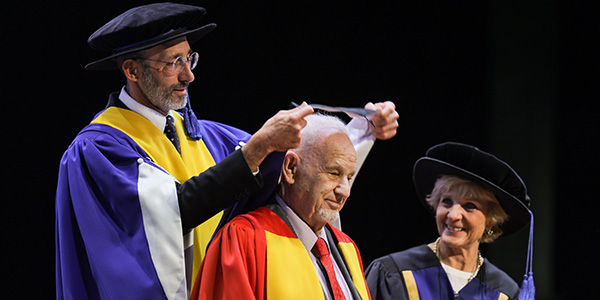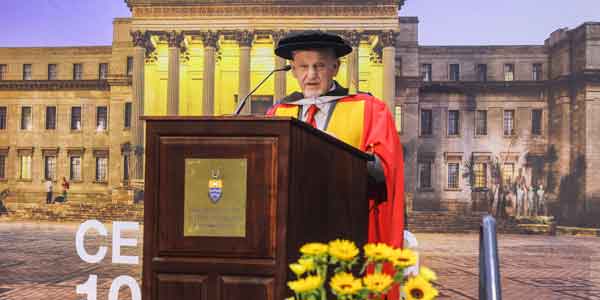Fine advice on failing, luck and limiting expertise
- Wits University
Wits University awarded Dr David Fine an honorary degree at the Faculty of Science graduation ceremony on 17 April 2023.

What do the Lockerbie bombing, landmines and pulmonary hypertension have in common?
Apart from being either deadly or potentially lethal, all three were a focus for innovation by the entrepreneurial chemist, Dr David Fine, who delivered the keynote address at the Faculty of Science graduation ceremony.
“The last time I was in this Hall was 59 years ago, when I received my BSc Honours degree, second-class, in chemistry. That was before all you graduates were born. It was before even most of your parents were born, so I feel it’s appropriate for me to mention some of the lessons learnt that I wish I’d known very much earlier,” said Fine, after congratulating all graduands and especially "those who are first in their family to receive a university degree”.
Lesson 1: Expertise blocks innovative thinking
The first lesson, Fine said, was in solving tough technical problems, “when you are taught that the way to solve a problem is to study it, become an expert, then you can solve the problem.”
But Fine says this approach doesn’t work, and he quotes Zen Buddhist master Shunryo Suzuki, “In the beginner’s mind there are many possibilities, but in the expert’s, there are few.”
The lesson is clear. Fine says, “If you’re an expert, it blocks a lot of your innovative thinking. You want to be the beginner. So the right way to solve the problem is to read about it just enough to understand. No more. Stop. Then think of all the possible solutions.”
For Fine, it’s always been the guiding principle: Don’t become too much of an expert if you want to innovate in that field.
Lesson 2: Expect resistance
Lesson two is the realisiation that you’re going to get push-back. “When you have new ideas, people very often don’t understand what you’ve done or don’t believe what you’ve done,” said Fine.
He recalls how, at an international meeting, his innovations irked some scholars in the field, who didn’t believe his findings, declared his work “rubbish”, and called him incompetent and a naïve fool – an unfortunate and ironic response to an innovator who now, at age 81, holds no fewer than 105 patents in the United States.
Over the course of his career, Fine has published 88 papers focusing on environmental hazards involving carcinogenic compounds, which he identified in foods, beverages, cosmetics, and industrial products.
He has made a significant contribution to the scientific understanding of chemical engineering processes, combustion engineering, and air pollution.
He pioneered the detection of hazardous levels of nitrosamines in foods, body fluids, and in the factory environment, which has important health implications given that chronic nitrosamine intake is associated with cancers, particularly of the digestive tract.
Nitrosamines are organic compounds that we are exposed to in our everyday lives. They exist in low levels in our water and foods, including meat, vegetables, and dairy products. Some nitrosamines may increase the risk of cancer if people are exposed to them above acceptable levels and over long periods of time.

Lesson three: The importance of chance
“We all meet our spouses and our lovers by pure chance, by pure accident, serendipity. That’s a very powerful tool. If it works so well in our personal lives, I started to use it in science as well,” said Fine.
Fine’s PhD at the University of Leeds in 1967 focused on thermal explosions and combustion chemistry. This sparked his interest in chemical engineering, fluid dynamics and heat transfer. After a postdoctoral stint at Leeds and then the University of Winnipeg, he joined the Massachusetts Institute of Technology, where he ran the Combustion Laboratory.
He later moved to Thermo Electron (now Thermo Fisher) where he worked for 28 years, and where he started his own federally funded research department.
This research focus would prove serendipitous some 20 years later, when explosions would feature frequently.
On 21 December 1988, Pan Am flight 103 exploded over Lockerbie, Scotland, after a bomb was detonated. All 259 people on board were killed.
Fine, then in his late forties, led the research on the detection of explosive residues, which was used to identify the explosives used in the Lockerbie bombing.
His team also developed the first airport sniffers for explosives and narcotics, and thousands of these devices are now used in airports worldwide.
The same decade, a US intercontinental ballistic missile blew up because of a leak in rocket fuel. Fine got fascinated by the compound in the fuel, called N?O?.
Fine’s curiosity reimagined that same compound for a drug to treat pulmonary hypertension. The US Federal Food and Drug Association approved the innovation in 2019.
In 2006, Fine established GeNO (now called Vero-Biotech), to develop the inhalable drug.
“It sounds very zigzag … but it was fun to just let your mind wander and go into the next area and start at the beginning again; be that young student again who has no clue what he’s getting into … Branching out into something different was very, very powerful.”
Lesson four: Thrive on failure
Fine cautioned the graduands: “When everything works when you’re a scientist, when everything’s going great, and you’ve had no failures for a while … beware of getting in trouble. And I say that very seriously, because you’re not pushing the limits of your mind, you’re not pushing the limits of your knowledge. You have to have failure. Failure is how you learn. You have to enjoy failure, thrive on failure, because that’s how you jump to the next level.”
In 1998, a decade after the Lockerbie bombing, Fine got interested in detecting landmines – but his efforts to unearth landmines failed spectacularly originally, due to TNT being undetectable in the real world for various reasons.
TNT is the chemical compound trinitrotoluene, one of the most widely used military high explosives.
The failure sparked renewed thinking about using then-emerging mobile phone technology and image analysis software, with metal detection. It worked. And the US army acquired the revolutionary metal detectors.
In 2000, Fine founded his own company, CyTerra, which developed radar and metal detection-based detectors for buried landmines.
"The lesson here was we had to fail. And this time it failed pretty badly before we could step back, rethink, and then come up with the right solution.”
Fine’s closing words to the graduands were: “Wits is a world-class university, and you graduate today with a world-class degree and with the skills and knowledge not only to change South Africa but the world. This is especially true if you have graduated today with advanced degrees. You are the future. You are the chosen. And you’re going to have so much fun as a world-class scientist.”
Fine’s generosity enabled the establishment of the Angela and David Fine Chair in Innovation at Wits University. The Wits Centre for Innovation (WIC) was launched the same day that Fine received his honorary degree from Wits.

